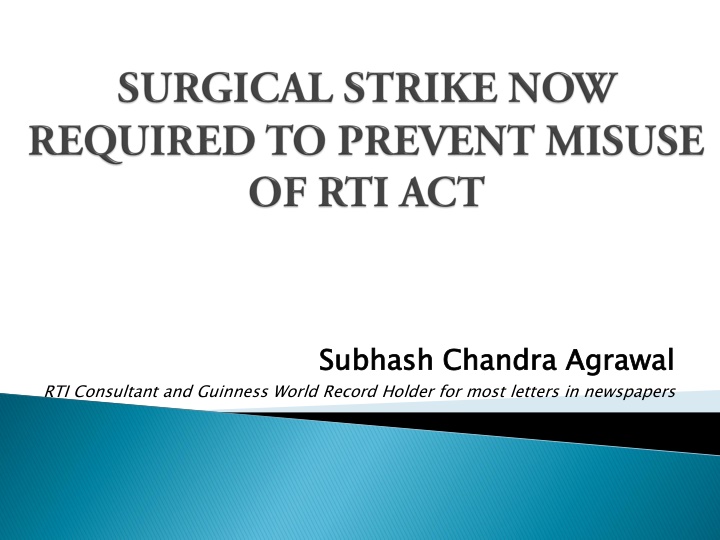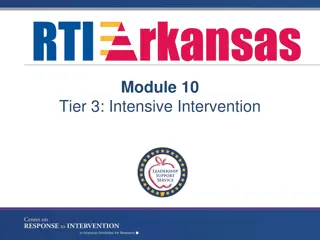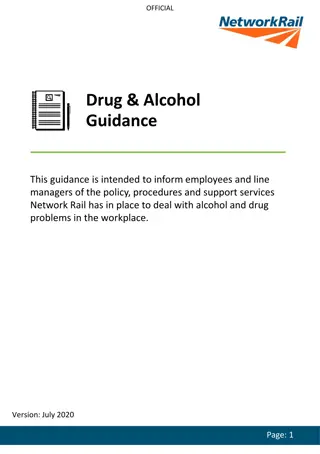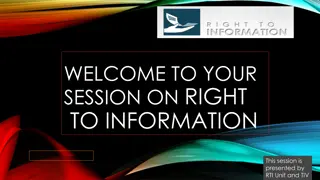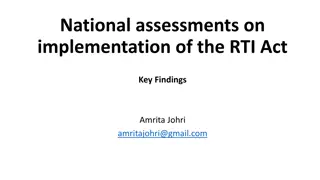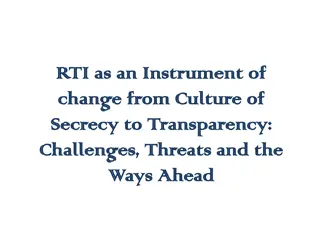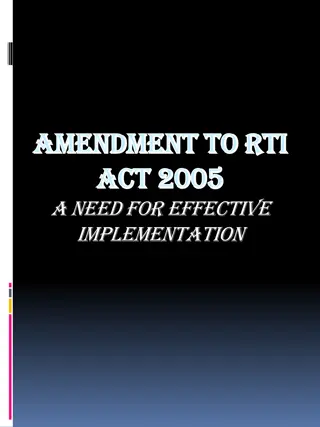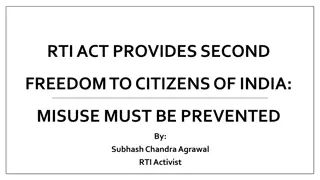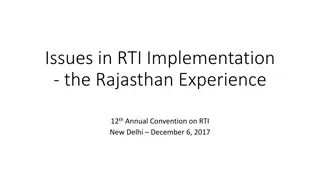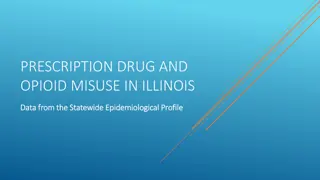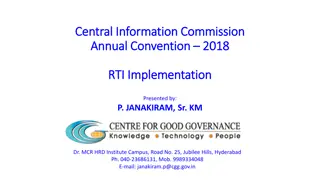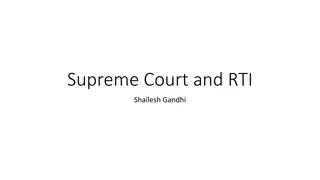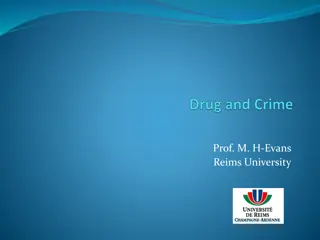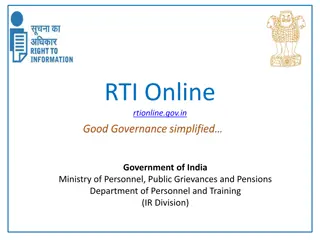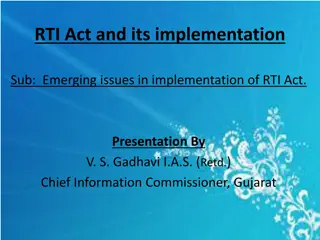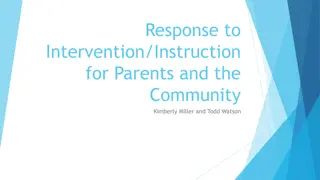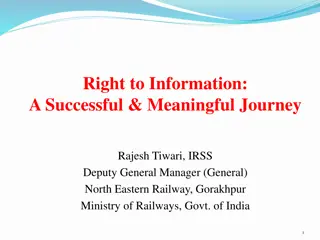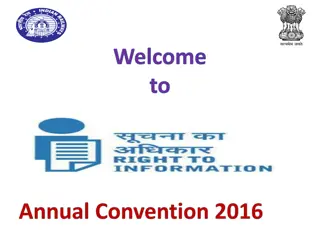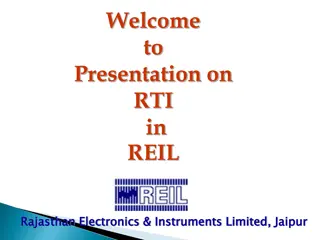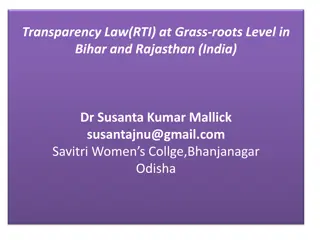Challenges and Solutions in Preventing Misuse of the RTI Act in India
Over the years, the RTI Act in India has faced challenges due to misuses by individuals for personal gains. Efforts to prevent such misuse through training, Supreme Court verdicts, and CVC circulars have been observed. The need for regular modifications and refinements to address misuse and maintain the Act's integrity is emphasized based on experiences and observations. Various instances of misuse and practical feedback highlight the importance of addressing this issue for the effective functioning of the RTI Act.
Uploaded on Sep 07, 2024 | 1 Views
Download Presentation

Please find below an Image/Link to download the presentation.
The content on the website is provided AS IS for your information and personal use only. It may not be sold, licensed, or shared on other websites without obtaining consent from the author.If you encounter any issues during the download, it is possible that the publisher has removed the file from their server.
You are allowed to download the files provided on this website for personal or commercial use, subject to the condition that they are used lawfully. All files are the property of their respective owners.
The content on the website is provided AS IS for your information and personal use only. It may not be sold, licensed, or shared on other websites without obtaining consent from the author.
E N D
Presentation Transcript
Subhash Chandra Agrawal Subhash Chandra Agrawal RTI Consultant and Guinness World Record Holder for most letters in newspapers
Experience with RTI Act as observed in its journey of eleven years in the country does lead to think for refining it with some suitable modifications so as to prevent its misuse. Modification and refining should be a regular on-going process, and so should be same for RTI Act in India. Cases of misuse of every Act in India including Dowry Act or the one legislated after infamous 16/12 Nirbhaya episode are regularly surfacing like also for misuse of RTI Act. India is gifted with brilliant minds, but negative side is that many in India misuse brilliance of their minds for negative deeds. Miscreants have started misusing RTI Act in India.
Percentage of such misuse is totally insignificant as per study done by them! Some Information Commissioners also endorsed that they noted just 5-7 percent cases of misuse are detected by them. But it is important to note that very few out of total RTI applications reach to stage of second appeal at Information Commissions. My regular experienced practical feedback about the grim situation of large-scale misuse of RTI Act faced by public- authorities My Experience Experience - After Conducting RTI workshops on basis with public-authorities, I have
One person used to file about one hundred RTI-applications per week at Delhi Fire Service, evidently for mischievous objectives. But a proper training provided to their officers arming them with Supreme Court verdict in case CBSE vs Aditya Bandopadhyaya resulted in preventing him playing mischief with the RTI Act. A person had been filing RTI petitions of nuisance nature in name of his friends/relations based in different cities of the country from the same post-office bearing the same format and signature signed by the same pen! Since there is no provision of asking for an Identity Proof of RTI applicant, wasting precious man-hours, resources, postal and stationery costs in dealing with such RTI petitions. It is also experienced that certain mischievous persons even misuse name of known activists by sending such complaints under unnecessary embarrassments concerned public-authority can do nothing but their names with forged signatures, which causes
CVC issued circular dated 10.03.2017 to all the CVOs of various 25.06.2014 in case Shri Ramesh Chand Jain vs DTC in which CVC CPIOs/Appellate Authorities of their organisations about the verdict. CVC had to issue such directions to CVOs only because of detection of large-scale misuse of RTI Act having been noted by it. The said CIC-verdict observed as under: Even a single repetition of RTI application would demand the valuable time of the public authority, first appellate authority and if it also reaches second appeal, that of the Commission, which time could have been spent to hear another appeal or answer another application or perform other public duty. Every responded will he an obstruction to flow of information and defeats the purpose of the RTI Act. public-authorities about CIC-verdict dated has asked all its CVOs to bring to notice of repetition of RTI application which was earlier
Guide misuse of RTI Act There are many CIC-verdicts passing stringent strictures on misuse of RTI Act, subsequently endorsed by Courts. Central Commissions and Department of Personnel & Training (DoPT) should compile all such verdicts on their websites so as to educate those handling RTI applications A person filing indiscriminate RTI applications sometimes about 50 in a day was prevented from doing so after strong strictures were passed against him by Hon ble Central Information Commission public-authorities through publicised verdicts on Information Commission, State information
Some public-authorities are in habit of misusing section 6(3) of RTI Act by unnecessarily transferring RTI petitions to hundreds/thousands offices even though information might exist with the transferring public- authority itself. Example UPA regime had adopted clever tactics to avoid uncomfortable RTI queries like status of government-bungalows like number 6, Krishna Menon Marg (New Delhi) and change in bungalow-number to 6-A from 8 at Krishna Menon Marg (New Delhi) etc perhaps because such queries directly related to personalities like the then Lok Sabha Speaker and a former Prime Minister. CPWD responses usually never carried names and contact-details of CPIOs and Appellate Authorities. Example petition to thousands of Income Tax Offices across the country where information was sought about those Non-Government-Organisations (NGOs) and political parties which are entitled for tax-exemption under Income Tax Act. Most of the Income Tax Offices replied that information relating to them as NIL . Example 1 1 - - Union Union Ministry Ministry of of Urban Urban Development Development ( (MoUD MoUD) ) in the earlier Example 2 2 - - Income Income Tax Tax Department Department (Headquarters) transferred an RTI
1 1) ) Increase Increasing RTI fees uniformly to rupees fifty with provision to provide first twenty copied pages free-of-cost. It will be economical in terms of man-hours spent and postal-charges for both the public-authorities and genuine RTI applicants and in demanding and remitting copying- charges. Charges have not been changed for more than one decade ID Misuse of filing RTI petitions in name of others or with non- existing persons has also become quite common. RTI Act does not permit those ex-Indians who later took nationality of some other country Provision of compulsorily attaching copy of ID proof should be there for filing complaints in government-departments to prevent filing complaints in name of others. Increase RTI RTI fees fees 2 2) ) ID proof proof should should be be compulsory compulsory with with RTI RTI applications applications
3 3) ) Issue CIC s repeated recommendations for introducing exclusive RTI stamps in several denominations Most popular mode of remitting RTI fees is through postal- orders which cost heavily to public-exchequer with handling cost of rupees 39.99 per postal-order, apart from banking- cost in clearing-operations Accept Indian receiving post-free RTI applications addressed to central public-authorities at just about 4500 post-offices. This facility should be available at all post-offices in the country which are about 160000 Providing such a facility will prove to be much more effective and useful than on-line filing of RTI petitions in a country where most people especially in rural India are still not using internet. Issue RTI RTI stamps stamps 4 4) ) Accept RTI RTI applications postal-department applications at at all presently all post post- -offices provides offices facility of
Disposals of RTI applications will be much-much faster even at stage of Information Commissions with frivolous petitions being largely eliminated. Huge stationery, mischievous account exchequers funded by hard-earned money of tax-payers, both at central and state levels will reduce. Since no quantum of training for handling RTI petitions can be sufficient to such large number of PIOs/public-authorities and others handing RTI petitions, effective ways to check misuse of RTI Act may be possible , which may ultimately be beneficial for genuine RTI-applicants. man-hours and frivolous other resources in RTI-applications burden like postal-charges or unnecessary handling public- for on
